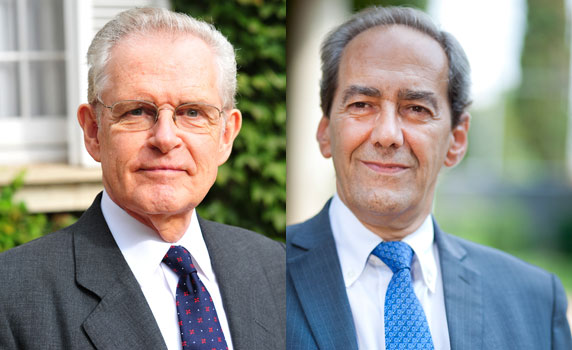
“Changes - not tweaks - in the rules of the game” are needed in Spain today, said IESE Prof. Antonio Argandoña, discussing reforms required for the country to adapt to the current social and economic environment.
IESE José Manuel González-Páramo said the reforms have become urgent because Spain did not implement the necessary measures for adjusting to a single currency, while other countries – such as Germany – did so.
Another reason for the urgency is the sheer complexity of the world as compared with a few decades ago, he said. Emerging countries currently produce 50 percent of the world’s GDP, and in 2050, four out of five of the most powerful countries in the world will be BRICs (Brazil, Russia, India and China).
The two IESE faculty members analyzed reforms and the role of companies in this context during a Continuous Education session titled, “Reconverting the Economy and Society: What Role Should Companies Play?,” organized by IESE’s Alumni Association on April 24 on the school’s Barcelona campus.
“The best way to carry out reforms is to generate an awareness of their necessity,” said Prof. González-Páramo.
Prof. Argandoña outlined various measures he views essential such as public sector austerity, reform of the financial sector and the application of taxes that are “equitable, fair, clear, simple and easy to apply.” The measures should also bolster efficiency, sustainability and transparency.
In the private sector, government policies should support competition and the reform of specific industries, as well as stimulate credit flows in order to strengthen the financial system, he said.
Also discussed was the importance of a healthy legal system that guarantees efficient and reliable regulating agencies, a separation of powers and legal safety.
“Technical competency is needed for the reforms; not only to identify problems, but also to be creative in finding alternatives for their solutions,” said González-Páramo, citing several obstacles that stand in the way, such as powerful special interest groups and poor government communication practices.
“In a crisis such as the current one, we need leaders who have the clarity to see what is happening and make necessary decisions; who know how to stand up to special interest groups and maintain a commitment to society and Europe,” he said. Anyone who wants to succeed in business should “understand that the situation is challenging, but also offers many opportunities.”
Prof. Argandoña concluded the session by recommending that business leaders “look after communication policies, identify alliances inside and outside the company, avoid overreacting, but also avoid losing time, and understand the changes that they will undergo,” not only in their own sectors, but in those that they may depend upon.